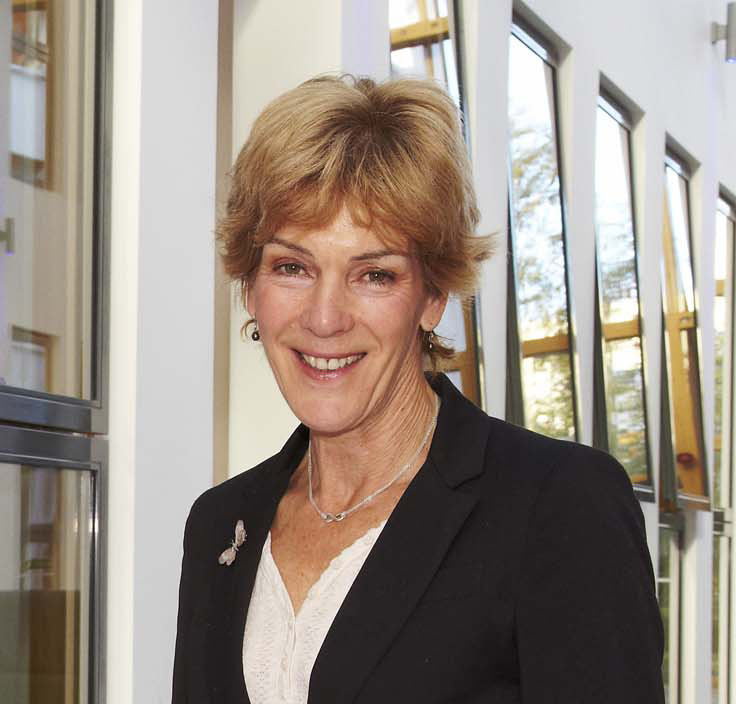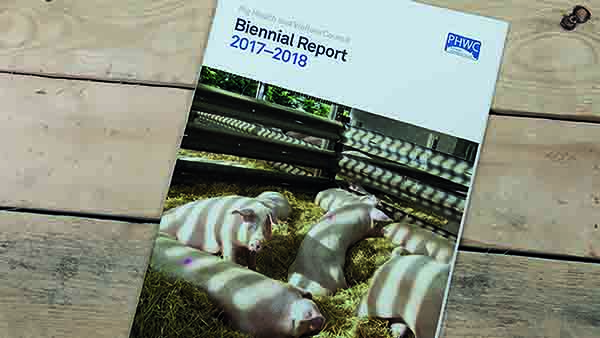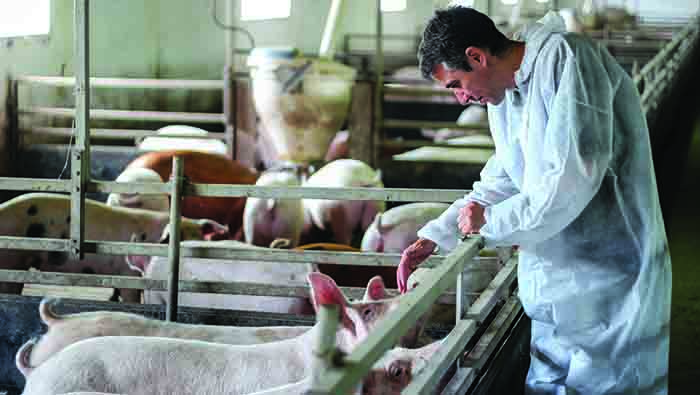Dr Jane Downes is trying to drive out disease and improve the welfare of pigs, as chair of the Pig Health & Welfare Council. But there are big challenges ahead, as she tells Chloe Ryan
Not many vets will tell you there are positives to the African swine fever (ASF) outbreak currently sweeping the globe. Millions of pigs have been culled across Asia, the virus continues to spread in Europe, recently arriving in Bulgaria for the first time and ASF DNA has just been found in Northern Ireland in sausage, illegally imported from Asia.

But Dr Jane Downes said there has been an unexpected upside to the threat very clearly hanging over the UK pig industry – it has made the Government and pig farmers far more aware of biosecurity.
“Certainly, ASF has helped in a way,” she said. “We want to keep the country’s borders safe and secure. Defra is getting the posters out and making people more aware of the risks. Having found the DNA in Northern Ireland, it has highlighted to people how it can come in.”
Biosecurity is just one facet of the remit of the Pig Health and Welfare Council (PHWC), of which Dr Downes is chair. The other main areas of focus include addressing the amount of endemic disease in the UK pig herd and looking at ways to improve pig welfare.
As well as upping biosecurity nationally, as Defra is doing with its poster campaign, it must also be tackled regionally and on individual farms. While many farmers are on top of their games, the challenge, Dr Downes stressed, is ‘engaging the unengaged’.
At regional level, the PHWC is keen for producers to sign up to the Significant Diseases Charter and share information on diseases like swine dysentery. You can take appropriate measures ‘if you know where the disease is, and you know your neighbours have an outbreak’, she said.
“On an individual farm level, most people know what they’ve got to do – it’s about getting it done properly each and every time and paying attention to detail,” she continued.
“So, we want to inspire people. And it is difficult when you’ve got a routine, and sometimesthings have to be done quickly. But it’s about embedding good biosecurity each and every time.
“Many people are doing it well each time. But we want to get to the people who aren’t doing it well. It’s about engaging the unengaged. We want to get the people who do things badly, or not very well, to do it well, rather than saying everyone has to do it better.”
PHWC has just launched its biennial report, looking ahead to the pig industry of the future. Tackling endemic diseases, notably PRRS, forms an important part of the strategy in the years to come.

Dr Downes stressed that it will be crucial, if the sector is to reduce antibiotic usage, to reduce the burden of disease first and foremost. Most of the ‘low hanging fruit’ on antibiotic reduction has already been taken. Now it’s time to stop pigs getting ill in the first place.
This, she believes, will be helped by the development of new vaccines, and embracing new technologies such as gene editing, which has already been used experimentally to produce pigs resistant to the PRRS virus.
Dr Downes, however, is well aware just how controversial anything involving genetics is with the public. “I have said we should support gene editing and the council supports it. But we need to help explain to people that this is just removing a gene from the pig so the PRRS virus can’t get in. It is not introducing anything else, so it’s not genetic modification – it is simply editing the pig’s genes.
“People always think about monsters, such as giant tomatoes or pigs with two heads, but researchers have bred several generations of these pigs now, and you have to make sure there are no problems.
We are going to have to rely on things like gene editing and new vaccines if we’re going to manage disease in ways other than with antibiotics.”
PHWC’s 2030 Vision, looking at how the pig industry should evolve over the coming decade, includes a statement saying the council should ‘proactively support technologies that reduce disease and the use of veterinary medicines and increase productivity, such as gene editing’.
There was a debate on whether to include support for gene editing in the vision. Some council members ‘went aagghh, but we persuaded people in the end,’ Dr Downes explained.
PRRS is the top disease issue the council wants to tackle. “If we can reduce the amount of PRRS, it reduces other diseases coming in and that will impact on antibiotic use. The focus has been on reducing antibiotics, but we want to flip that, so the focus is on driving down disease and then you don’t need the antibiotics.”
When it comes to welfare, there are two areas the council is focusing on – tail docking and farrowing.
With routine tail docking banned in the EU, producers can only dock tails if they can show evidence it is necessary for welfare reasons and they have tried to implement other measures to address tail biting. The majority of pigs in the UK are still docked. More research on the triggers for tail biting is crucial, Dr Downes said.
“Nobody knows what the trigger is from having no tail biting one day to tail biting the next; there is research on temperature and humidity changes to see what the driver is for this to start. We know it’s not about indoor versus outdoor, straw and slats; but we don’t know enough about it.”
When it comes to the use of farrowing crates and free farrowing, the council’s welfare group is looking at the welfare issues on both sides of the argument to try and produce some proper evidence.
Dr Downes said there was a surprising lack of evidence to back up claims that the UK has the highest welfare standards, something the PHWC wants to rectify. This might be particularly pertinent after the UK leaves the EU and we come to negotiating trade deals.
“For the future, we always say we have the highest welfare standards, but we don’t have the evidence to prove that across the board,” she said. “So, what is the robust evidence we need when we are talking to people across the world?
“We’ve got the Real Welfare programme in place, but we think we can build on that and do better.”
PHWC’s biennial report
The Pig Health and Welfare Council is a cross-industry alliance, aiming to promote an integrated approach to improving pig health and welfare.
The members represent the entire pork chain – from farm to processing, allied industries including animal feed, welfare charities, government departments and local authorities and academia.
It has four sub-groups covering: antimicrobial usage, disease surveillance, pig meat food safety and pig welfare.
Dr Downes unveiled its latest biennial report, for 2017-18, outlining the council’s achievements and setting out its priorities, at the Great Yorkshire Show in July.
It includes a strategy for developing the new 20:30 Vision: To secure a safe, sustainable and profitable industry that has the ability to invest in new technologies, disease-control measures and high welfare standards in all production systems to meet the requirements of present customers and new emerging markets.
PHWC has identified six themes, which the wider industry is being consulted on. These are:
- Partnership working with those in the pig industry and other farm animal sectors;
- Maintain and extend disease surveillance;
- Reduce, control or eliminate endemic disease, including those with food safety implications, with the aim of reducing the need for the use of antibiotics;
- Use of data and new technologies;
- Provide evidence that all production systems provide for physical and mental wellbeing;
- Promote professional skills.
Jane’s various roles
- Veterinary surgeon and chair of the Pig Health & Welfare Council;
- Has held senior positions within the Meat Hygiene Service and the Food Standards Agency;
- Chair of the Food and Drink Qualifications, promoting food training and apprenticeships; and
- Member of Defra’s Farm Animal Welfare Council and the Disciplinary Committee of the Royal College of Veterinary Surgeons.




